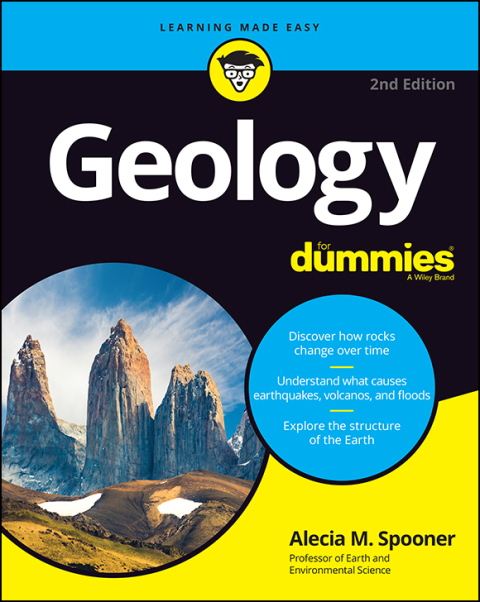Description
Efnisyfirlit
- Cover
- Introduction
- About This Book
- Foolish Assumptions
- Icons Used in This Book
- Beyond the Book
- Where to Go from Here
- Part 1: Studying the Earth
- Chapter 1: Rocks for Jocks (and Everybody Else)
- Finding Your Inner Scientist
- Focusing on Rock Formation and Transformation
- Mapping Continental Movements
- Moving Rocks around on Earth’s Surface
- Interpreting a Long History of Life on Earth
- Chapter 2: Observing Earth through a Scientific Lens
- Realizing That Science Is Not Just for Scientists
- Using a Methodical Approach: The Scientific Method
- Building New Knowledge: A Scientific Theory
- Speaking in Tongues: Why Geologists Seem to Speak a Separate Language
- Chapter 3: From Here to Eternity: The Past, Present, and Future of Geologic Thought
- Catastrophe Strikes Again and Again
- Early Thoughts on the Origin of Rocks
- Developing Modern Geologic Understanding
- Uniformi-what? Understanding the Earth through Uniformitarianism
- Pulling It All Together: The Theory of Plate Tectonics
- Forging Ahead into New Frontiers
- Chapter 4: Home Sweet Home: Planet Earth
- Earth’s Spheres
- Examining Earth’s Geosphere
- Part 2: Elements, Minerals, and Rocks
- Chapter 5: It’s Elemental, My Dear: A Very Basic Chemistry of Elements and Compounds
- The Smallest Matter: Atoms and Atomic Structure
- Chemically Bonding
- Formulating Compounds
- Chapter 6: Minerals: The Building Blocks of Rocks
- Meeting Mineral Requirements
- Making Crystals
- Identifying Minerals Using Physical Characteristics
- Realizing Most Rocks Are Built from Silicate Minerals
- Remembering the Nonsilicate Minerals
- Gemstones
- Chapter 7: Recognizing Rocks: Igneous, Sedimentary, and Metamorphic Types
- Mama Magma: Birthing Igneous Rocks
- Merging Many Single Grains of Sand: Sedimentary Rocks
- Stuck between a Rock and a Hard Place: Metamorphic Rocks
- Tumbling through the Rock Cycle: How Rocks Change from One Type to Another
- Part 3: One Theory to Explain It All: Plate Tectonics
- Chapter 8: Adding Up the Evidence for Plate Tectonics
- Drifting Apart: Wegener’s Idea of Continental Drift
- Coming Together: How Technology Sheds Light on Plate Tectonics
- Chapter 9: When Crustal Plates Meet, It’s All Relative
- Density Is Key
- Two of a Kind: Continental and Oceanic Crust
- Understanding Why Density Matters: Isostasy
- Defining Plate Boundaries by Their Relative Motion
- Shaping Topography with Plate Movements
- Chapter 10: Who’s Driving This Thing? Mantle Convection and Plate Movement
- Running in Circles: Models of Mantle Convection
- Using Convection to Explain Magma, Volcanoes, and Underwater Mountains
- Shake, Rattle, and Roll: How Plate Movements Cause Earthquakes
- Part 4: Superficially Speaking: About Surface Processes
- Chapter 11: Gravity Takes Its Toll: Mass Wasting
- Holding Steady or Falling Down: Friction versus Gravity
- Focusing on the Materials Involved
- Triggering Mass Movements
- Moving Massive Amounts of Earth, Quickly
- A More Subtle Approach: Creep and Soil Flow (Solifluction)
- Chapter 12: Water: Above and Below Ground
- Hydrologic Cycling
- Streams: Moving Sediments toward the Ocean
- Eroding a Stream Channel to Base Level
- Seeking Equilibrium after Changes in Base Level
- Leaving Their Mark: How Streams Create Landforms
- Flowing beneath Your Feet: Groundwater
- Chapter 13: Flowing Slowly toward the Sea: Glaciers
- Identifying Three Types of Glaciers
- Understanding Ice as a Geologic Force
- Eroding at a Snail’s Pace: Landforms Created by Glacial Erosion
- Leaving It All Behind: Glacial Deposits
- Where Have All the Glaciers Gone?
- Chapter 14: Blowing in the Wind: Moving Sediments without Water
- Lacking Water: Arid Regions of the Earth
- Transporting Particles by Air
- Deflating and Abrading: Features of Wind Erosion
- Just Add Wind: Dunes and Other Depositional Wind Features
- Paving the Desert: Deposition or Erosion?
- Chapter 15: Catch a Wave: The Evolution of Shorelines
- Breaking Free: Waves and Wave Motion
- Shaping Shorelines
- Categorizing Coastlines
- Part 5: Long, Long Ago in This Galaxy Right Here
- Chapter 16: Getting a Grip on Geologic Time
- The Layer Cake of Time: Stratigraphy and Relative Dating
- Show Me the Numbers: Methods of Absolute Dating
- Relatively Absolute: Combining Methods for the Best Results
- Eons, Eras, and Epochs (Oh My!): Structuring the Geologic Timescale
- Chapter 17: A Record of Life in the Rocks
- Explaining Change, Not Origins: The Theory of Evolution
- The Evolution of a Theory
- Putting Evolution to the Test
- Against All Odds: The Fossilization of Lifeforms
- Correcting for Bias in the Fossil Record
- Hypothesizing Relationships: Cladistics
- Chapter 18: Time before Time Began: The Precambrian
- In the Beginning … Earth’s Creation from a Nebulous Cloud
- Addressing Archean Rocks
- Originating with Orogens: Supercontinents of the Proterozoic Eon
- Single Cells, Algal Mats, and the Early Atmosphere
- Questioning the Earliest Complex Life: The Ediacaran Fauna
- Chapter 19: Teeming with Life: The Paleozoic Era
- Exploding with Life: The Cambrian Period
- Building Reefs All Over the Place
- Spinal Tapping: Animals with Backbones
- Planting Roots: Early Plant Evolution
- Tracking the Geologic Events of the Paleozoic
- Chapter 20: Mesozoic World: When Dinosaurs Dominated
- Driving Pangaea Apart at the Seams
- Repopulating the Seas after Extinction
- The Symbiosis of Flowers
- Recognizing All the Mesozoic Reptiles
- Climbing the Dinosaur Family Tree
- Flocking Together: The Evolutionary Road to Birds
- Laying the Groundwork for Later Dominance: Early Mammal Evolution
- Chapter 21: The Cenozoic Era: Mammals Take Over
- Putting Continents in Their Proper (Okay, Current) Places
- Entering the Age of Mammals
- Living Large: Massive Mammals Then and Now
- Right Here, Right Now: The Reign of Homo Sapiens
- Arguing for the Anthropocene
- Chapter 22: And Then There Were None: Major Extinction Events in Earth’s History
- Explaining Extinctions
- End Times, at Least Five Times
- Modern Extinctions and Biodiversity
- Part 6: The Part of Tens
- Chapter 23: Ten Ways You Use Geologic Resources Every Day
- Burning Fossil Fuels
- Playing with Plastics
- Gathering Gemstones
- Drinking Water
- Creating Concrete
- Paving Roads
- Accessing Geothermal Heat
- Fertilizing with Phosphate
- Constructing Computers
- Building with Beautiful Stone
- Chapter 24: Ten Geologic Hazards
- Changing Course: River Flooding
- Caving In: Sinkholes
- Sliding Down: Landslides
- Shaking Things Up: Earthquakes
- Washing Away Coastal Towns: Tsunamis
- Destroying Farmland and Coastal Bluffs: Erosion
- Fiery Explosions of Molten Rock: Volcanic Eruptions
- Melting Ice with Fire: Jokulhlaups
- Flowing Rivers of Mud: Lahars
- Watching the Poles: Geomagnetism
- Index
- About the Author
- Supplemental Images
- Advertisement Page
- Connect with Dummies
- End User License Agreement






Reviews
There are no reviews yet.